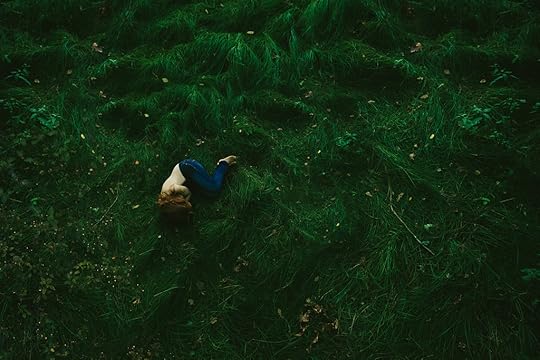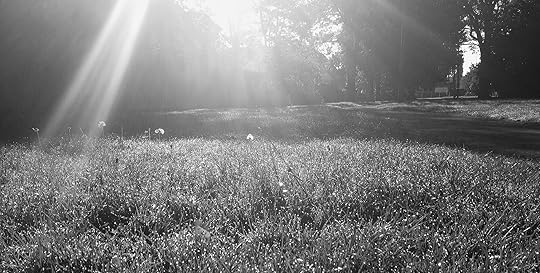Meg Sefton's Blog, page 80
September 5, 2014
batchata cha cha
It was appropriate she lived on the edge, the edge of town, the outer edge along the woods that will sometime be subsumed by buildings but for now she caught a glimpse of what it was like to look into trees, the dark hollows they created by their limbs. She lived in a small house three stories high and each story faced the pines and scrub oak and the hidden homeless, black bears, and garbage people in the town threw out. The woods sometimes yielded odd things she collected and saved, such as a Merengue CD covered in dirt and filth she washed and played in her CD player, the words foreign but the tune and beat so upbeat she had to move her hips a bit while she sashayed across her small living room, the tune spilling out into the inky darkness.
One morning she found a dollhouse exactly like the dollhouse of her girlhood. It was only soiled a bit, but it was the same basic white frame house, three stories, interestingly, she thought to herself, the same structure as her own house though the rooms were distributed differently. She brought it inside and cleaned it. Her suitor, a Norweigan who liked to fix things, patched the tiny broken furniture inside and the tiny shingles on the roof. He painted each room and the exterior as well. The one requirement, she told him, was that he was to leave the kitchen table legs and dining chair legs as they were: White with brownish red tips. When she was a girl, she had nightmares the table and chair legs were really matches and that if you scraped them the wrong way, the house would go up in flames. She don’t know why she wanted them the same way. She just did.
I started telling the story by saying it was appropriate the woman of our story lived on the edge of town and maybe that is because in her beige little living room where she lies down and stares at nothing sometimes and wonders whether she will make it she is constantly reminded of another edge: The edge of death, of illness. It is an edge, she knows now, that not everyone has to face, at least not in the middle of their life. It is an empty edge, the edge of oblivion. When you stare at that edge, you stare into your own silence. She is glad for the red pillows that dot the beige sofa, ottoman, chairs. They catch her gaze. They ignite her interest. Each is different and she has selected them carefully. She is glad for the dollhouse that reminds her of her girlhood, the table and chairs in the dollhouse whose tips reminded her of matches. She enjoys the memory even though in her younger years, she was frightened, she was frightened the night of that Christmas day when she saw all she wanted – a beautiful house her parents had constructed for her in secret – whose very existence might be threatened by what’s inside. She hopes the woods will never go away. Even if she finds a bear there, if one should meet her on the doorstop as she is fumbling with the lock or if one day, in her foolhardiness, she should wander out into them with a compass and a sandwich, she hopes she will day in the place she bought, her own death, chosen and full of danger.


August 14, 2014
cup of canopus 13
He got into her every pore, he filled her up, he penetrated her. He sought to become her conqueror, her possessor. Should she struggle, he tightened the noose, the jaws of the trap shut tighter, the barbed wire around her skin tore her flesh. She was no longer free.
How had she chosen this? Was it his fault she had chosen him as her captor? She loved him, yet he had come close several times to poisoning her or keeping her from life-saving medicine. He didn’t intend it so it seems or so he claims. Skywriting, her love her passion, was drying up while she brought him beverages to slake his thirst. It would kill her to comfort him yet she would do it perfectly, passionately, just to have him say he loved her, to see him smile at her, to watch his eyes, pleased.
Where came this need of hers that ruled her, that overrode every other desire? It was created by the hole left when she was marked for dying and there was no one. She had not known how to sustain others’ interest in her while she was ill. Even her own deserted her and said they were not responsible.
Had she kept her plane for skywriting and the corvus oil she coud have penned an alarm but as it was, she sold these things to purchase her beauty and secure his love for a few more months of her life.


July 30, 2014
fledermaus
I started a new blog for women who want to speak their mind, anonymously, about anything. The blog may very well become a journal. You can keep up with the progress of the project here: fledermaus. Consider the quotes below concerning our freedom and the freedom of others around the world. Women are especially vulnerable in exercising their right to free speech, even in writing fiction and work that is not intended to be taken literally. Fledermaus will be for all works of fiction or nonfiction, regardless of genre as long as the writing sings. Speak to us and let us hear your voice. Women from all over the globe are invited to submit their work. More details will be posted soon. Thank you for your interest. Here are the promised quotes:
“A desire for privacy does not imply shameful secrets; Moglen argues, again and again, that without anonymity in discourse, free speech is impossible, and hence also democracy. The right to speak the truth to power does not shield the speaker from the consequences of doing so; only comparable power or anonymity can do that.”
― Nick Harkaway, The Blind Giant
“Proclaim the truth and do not be silent through fear.”
― Catherine of Siena
“This is slavery, not to speak one’s thought.”
― Euripides, The Phoenician Women
“Restriction of free thought and free speech is the most dangerous of all subversions. It is the one un-American act that could most easily defeat us.”
[The One Un-American Act, Speech to the Author's Guild Council in New York, on receiving the 1951 Lauterbach Award (December 3, 1952)]”
― William O. Douglas
“Imagination sees the complete reality, – it is where past, present and future meet… Imagination is limited neither to the reality which is apparent – nor to one place. It lives everywhere. It is at a centre and feels the vibrations of all the circles within which east and west are virtually included. Imagination is the life of mental freedom. It realizes what everything is in its many aspects … Imagination does not uplift: we don’t want to be uplifted, we want to be more completely aware.”
― Khalil Gibran


July 19, 2014
The 35 Writers Who Run the Literary Internet
 Originally posted on Flavorwire:
Originally posted on Flavorwire:
The debate as to whether the Internet is good or bad for literature doesn’t seem any closer to resolution now than when it began, years ago, but the fact remains that some people in the literary world are excellent at using Twitter, Tumblr, Facebook, and even Instagram or Pinterest to communicate with readers and get people interested in what they’re writing. These aren’t the writers who have hundreds of thousands of Twitter followers but only tweet when they have a book come out, or the ones who write a guest blog post every year to get their names back into the conversation.
View original 2,104 more words


June 25, 2014
Tiny Dreams, at Beakful
June 13, 2014
clarity and a ka-bar
Things did not become clear to her until she fell on a knife which pierced the base of her skull. The knife, a ka-bar Marine Corps Fighting Knife, to be precise, was lying in a pile of her stuff on the floor and she tripped and feel into the stuff and the knife pierced her flesh and bone. As her own blood soaked her hair and the pile of towels she had made to put away, a pile of laundry and shoes, as well as the typical sundry things she has told her son belong in his room and his alone – his jock strap for instance, his athletic cup – she thought she finally knew the nature of life and that is to always be striving and yet falling behind.
She had dumped him too late, the marine who wasn’t divorced yet, only separated, who brought over the ka-bar, a knife that cut a tree in half he said and though he possessed weapons to kill he had not filed and yet he wanted everything and yet there she bled, rejecting him, finally, in her mind, breaking up with him. She had the last word, she told herself, she did, not him.
We are born falling behind, she thought. Even when we come into our powers young, we lose them again as children grow, spouses leave, our own powers and will fade through illness and age, and it is almost appropriate that we be knifed and be left to lie like animals after a fresh kill.
Why he left the knife for her, she does not know. He kept it in a sheath on his hip but he was showing it off and they must have made love and he must have left it there, distracted, bothered by the failure of his own marriage, desperate not to be alone, and she, liking the attention and not even caring she was a fill in girl, going along for the moment, this lonely shared moment when others were succeeding. This shared failure that kept her up at night, thinking, about it and how it was nice and yet not nice at the same time. She was finally pierced by his rejection though he would have said, and his conscious did believe, that he loved her. He did not. She was a pin cushion, a living doll whom he dressed with his comments. He left the knife there on purpose though his conscious mind would have rejected the idea.
It became clear, how some are losers, like herself, have always been, it’s just the occasional scrim of seeming success allows her to fool herself. But she didn’t care, she was returning to earth, finally, the will to live gone with the blood. She would call the ambulance dispatch, yes, her phone was nearby but they would arrive too late and only she could be in charge of her death and so she broke up, finally, with the broken man, and begged for forgiveness of her son by falling on the knife, finally, and leaving him, this boy, the wing of her heart, this dove of a man.
She fell asleep in her blood, that is what it felt like, those moments of half conscious dreaming. A bear chased her. He ripped through her. She told her child to run. “Run!” was all she heard someone say to the empty house and she recognized the voice as her own. And she slipped into the darkness but had no sensations of fear, only release.


May 28, 2014
stay of execution
May 1, 2014
good bye my love
Now that I have said good bye, I dream of you more and more. And is it the you you really are or the idealized you of our childhood and early romance? I think the latter, for in the saying of our good byes and in the living with our good byes, don’t our dreams come back to soothe us, tattered coats to stay the chill? In my new house already old with all I’ve brought with me from past lives, all I’ve received from you to add to what’s gone, the walls, the ceilings, the fixtures shed their grief like soft downy snow, the dust of our flesh, what has been but what is no longer, this dust it falls in outlines on the floor, marking faint impressions of our bodies.
Your eyes are what I remember, their soft brown, the memory of what they were to me in my girlhood and how they looked at me when I was a woman and what I saw there and wanted to see, and the face as well that has seen struggle and loss and hardship, and the hands, known to me since you were young, the fingers, beautiful and long, now worn from work in sun and rain and cold.
I love you and will always no matter what the reason for this impassable divide. I never thought, as a girl, as a young woman anything could divide romantic love, sever it neatly. That was when oceanic feelings still engulfed me and I and my lover were inseparable and he thought what I thought and he loved as I loved, in equal measure, with identical expression, with obedience to the same rules.
I became a child again with you. I indulged the little child once more and that innocence and belief revealed themselves this final time before I turned to walk the road alone in my flat shoes on the path that is soil, that which I will one day become.
The moment I said goodbye, I lay down, exhausted, and slept. I dreamed you were opening a front door for me. I dreamed we were going into someone’s home, maybe our own home, to eat ice cream and pie. We laughed because we were going to eat butter pecan ice cream with our pecan pie. So many pecans we said. The door was heavy, wooden, carved, the foyer a dark, carved wood. I write this and know it would have been the very thing you would have loved, that foyer, that wood, that carving. I write this because isn’t it the sweetest torture there is to be released from someone while at the same time loving them most deeply in their best self, mourning what was, before there was dust. I write this remembering how many times, in our flesh, we spoke of ice cream.


February 20, 2014
My Mother is a Wolf

My mother is a wolf. She is with me at the campsite. There is a sign that specifically says do not keep food accessible to wild animals. She sits at the table and has tea with me. She is sitting on her haunches.
My mother is crying. She says there are things she never taught me: how to sew from a pattern, how to manage my accounts, how to plan for a week’s worth of shopping. Her paw is on my hand. It is warm from scrambling over the sun-kissed rock, from a blood that has become different from the way my blood runs, which is almost reptilian by comparison.
I have no feeling any more, mother, I say, no regrets. I am serving the cinnamon tea. I am serving it in delicate white china.
In the sun, my mother is beautiful. In the sun, the blue of her eyes like the sky penetrate my defenses.
I did not raise you this way, to take the hardships of your life this way, she says. I never told you it would always be the same. There are things you must do now to become who you must become.
The smoke of the fire curls up into the air. I wonder if my mother will return that evening with the other wolves, to threaten me for my meager fare — a bird shot in midflight, a rabbit caught in a snare. I wonder if she will return for me.
She had come to see me during the day at other times, and not for tea, and not for any reason. I have felt the presence of the others hovering about the trees. So far, it has not resulted in anything, only a mild abrasion on the cheek when we kissed, an unintentional scraping, drawing a faint line of blood.
I am disappointing her, I feel, and yet I cannot move on. My old life is behind me, in ruins. I mourn it as for an ancient city, burning. My beginning has no map. My mother is not the woman in the yellow dress cooking dinner for my father and my brother and sister. All histories have melted away and these old regrets live on top of the mountain. And yet, except for a few tears, my mother runs in packs at night. I know she protects me, for in the morning, there is a drop of blood in the corner of her mouth or in the web of her paws that she does not explain but wipes away on a napkin.
And yet I continue to straighten the napkins and check the egg timer for steeping.
© 2013 Meg Sefton
Published in Apocrypha and Abstractions, February 20, 2014


Meg Sefton's Blog
- Meg Sefton's profile
- 17 followers















